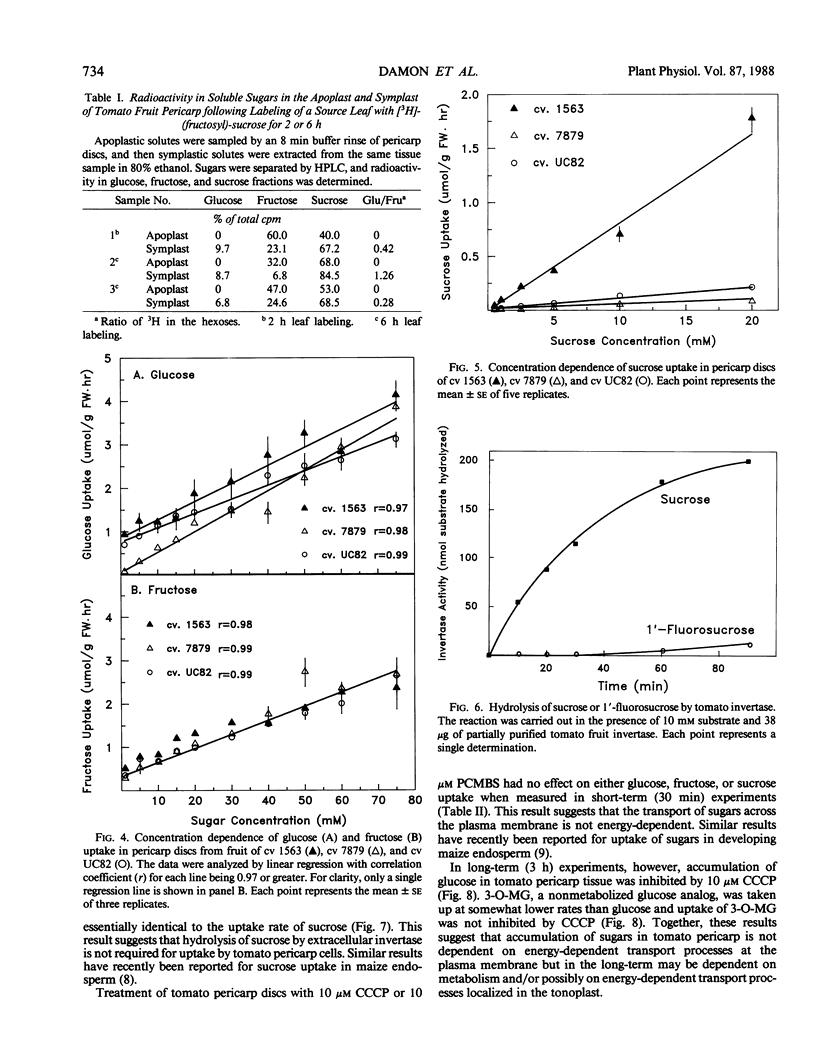Abstract
Analysis of [3H]-(fructosyl)-sucrose translocation in tomato (Lycopersicon esculentum Mill.) indicates that phloem unloading in the fruit occurs, at least in part, to the apoplast followed by extracellular hydrolysis. Apoplastic sucrose, glucose, and fructose concentrations were estimated as 1 to 7, 12 to 49, and 8 to 63 millimolar, respectively in the tomato fruit pericarp tissue. Hexose concentrations were at least four-fold greater than sucrose at all developmental stages. Short-term uptake of [14C]sucrose, -glucose, and -fructose in tomato pericarp disks showed first order kinetics over the physiologically relevant concentration range. The uptake rate of [14C]-(glucosyl)-1′-fluorosucrose was identical to the rate of [14C]sucrose uptake, suggesting sucrose may be taken up directly without prior extracellular hydrolysis. Short-term uptake of all three sugars was insensitive to 10 micromolar carbonyl cyanide m-chlorophenylhydrazone and to 10 micromolar p-chloromercuribenzene sulfonic acid. However, long-term accumulation of glucose was sensitive to carbonyl cyanide m-chlorophenylhydrazone. Together these results suggest that although sucrose is at least partially hydrolyzed in the apoplast, sucrose may enter the metabolic carbohydrate pool directly. In addition, sugar uptake across the plasma membrane does not appear to be energy dependent, suggesting that sugar accumulation in the tomato fruit is driven by subsequent intracellular metabolism and/or active uptake at the tonoplast.
Full text
PDF





Selected References
These references are in PubMed. This may not be the complete list of references from this article.
- Bradford M. M. A rapid and sensitive method for the quantitation of microgram quantities of protein utilizing the principle of protein-dye binding. Anal Biochem. 1976 May 7;72:248–254. doi: 10.1006/abio.1976.9999. [DOI] [PubMed] [Google Scholar]
- Giaquinta R. Sucrose Hydrolysis in Relation to Phloem Translocation in Beta vulgaris. Plant Physiol. 1977 Sep;60(3):339–343. doi: 10.1104/pp.60.3.339. [DOI] [PMC free article] [PubMed] [Google Scholar]
- Griffith S. M., Jones R. J., Brenner M. L. In Vitro Sugar Transport in Zea mays L. Kernels : I. Characteristics of Sugar Absorption and Metabolism by Developing Maize Endosperm. Plant Physiol. 1987 Jun;84(2):467–471. doi: 10.1104/pp.84.2.467. [DOI] [PMC free article] [PubMed] [Google Scholar]
- Hitz W. D., Schmitt M. R., Card P. J., Giaquinta R. T. Transport and metabolism of 1'-fluorosucrose, a sucrose analog not subject to invertase hydrolysis. Plant Physiol. 1985 Feb;77(2):291–295. doi: 10.1104/pp.77.2.291. [DOI] [PMC free article] [PubMed] [Google Scholar]
- Hsu F. C., Bennett A. B., Spanswick R. M. Concentrations of sucrose and nitrogenous compounds in the apoplast of developing soybean seed coats and embryos. Plant Physiol. 1984 May;75(1):181–186. doi: 10.1104/pp.75.1.181. [DOI] [PMC free article] [PubMed] [Google Scholar]
- Robinson N. L., Hewitt J. D., Bennett A. B. Sink metabolism in tomato fruit : I. Developmental changes in carbohydrate metabolizing enzymes. Plant Physiol. 1988 Jul;87(3):727–730. doi: 10.1104/pp.87.3.727. [DOI] [PMC free article] [PubMed] [Google Scholar]
- Schmalstig J. G., Hitz W. D. Transport and Metabolism of a Sucrose Analog (1'-Fluorosucrose) into Zea mays L. Endosperm without Invertase Hydrolysis. Plant Physiol. 1987 Dec;85(4):902–905. doi: 10.1104/pp.85.4.902. [DOI] [PMC free article] [PubMed] [Google Scholar]
- Yelle S., Hewitt J. D., Robinson N. L., Damon S., Bennett A. B. Sink Metabolism in Tomato Fruit : III. Analysis of Carbohydrate Assimilation in a Wild Species. Plant Physiol. 1988 Jul;87(3):737–740. doi: 10.1104/pp.87.3.737. [DOI] [PMC free article] [PubMed] [Google Scholar]


